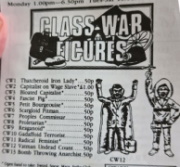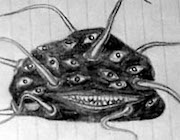|
Antonymous posted:
no there's a difference between exercising political will unilaterally and through a popular mandate
|
|
|
|

|
| # ? May 20, 2024 10:30 |
|
Antonymous posted:during FDR's 4 terms (president for life?) The 22nd amendment didn’t exist yet. The two term limit was a tradition established by Washington, it wasn’t binding. Running for and winning elected office within the rules of the constitution and legislation and then using the power afforded by that office to do the things you said you would do isn’t dictatorship. That’s how democracy is actually supposed to work.
|
|
|
|
Lol that the concept of governments who actually do things is now being lost in the mists of time and pretty much like Hitler if you think about it
|
|
|
|
|
threatening the nice inscrutable god kings who can declare laws void unilaterally is a dictatorship, proper representative politics is when you just meekly yield to their rulings no matter how insane they are
|
|
|
|
John Charity Spring posted:saying this to the average american is like going up to a devout catholic and talking poo poo about several of their favourite popes https://twitter.com/cinimodvii/status/1521838520515678208
|
|
|
|
Antonymous posted:emancipation proclamation were both extra-legal (illegal) measures and lincoln didn't even win the popular vote so he doesn't get out of that argument anyway. Nah, the emancipation proclamation was perfectly legal, because it was limited to slaves in states currently in rebellion and didn't actually ban slavery after the war's end; seizing enemy property and freeing the slaves of the enemy was already a well-precedented war power (which is pretty obvious if you think about if - if you're at war with another country, and a slave escapes across the front lines, what, are you gonna return him to his master?).
|
|
|
|
YOLOsubmarine posted:The 22nd amendment didn’t exist yet. The two term limit was a tradition established by Washington, it wasn’t binding. Running for and winning elected office within the rules of the constitution and legislation and then using the power afforded by that office to do the things you said you would do isn’t dictatorship. That’s how democracy is actually supposed to work. many "dictators" legally hold power until their death. Many come to power as the head of popular movements. Mao was hugely popular. Syngman Rhee won his election. Nazis became the biggest party and hitler was made chancellor legally. I'm trying to hold USA to the same standard it holds for Maduro or w/e. I don't mean dictator as a pejorative, more in the political science vein. but if I'm wrong OK
|
|
|
|
MeatwadIsGod posted:From what I know of it, it wouldn't be accurate to pin the majority of bishop or priest deaths on the anarchists/CNT-FAI. The church was hated pretty strongly by the lower classes in general, and you'd be hard pressed to find a more reactionary and entrenched state organ than the Spanish church. IIRC something like half of all the civilian killings in the Republican-held areas took place within the first few months of the war, with most of the killings in major cities like Barcelona (where CNT was strong) and Madrid (where UGT and PCE/PSUC were strong). To be sure the CNT-FAI was responsible for some dumb poo poo as was alluded to upthread, but I think the focus on priest-killing stems from narratives spun by the nationalists during and after the war since naturally it shocked the sensibilities of western countries (even as the nationalists racked up a much, much higher death toll in their areas). nationalist retributions were about 7:1 iirc
|
|
|
|
Slavvy posted:Lol that the concept of governments who actually do things is now being lost in the mists of time and pretty much like Hitler if you think about it gonna crack a minute and let a bit of lib brain out: its insanely cool how the concept of "actually doing things to improve the lives of citizens" has been so thoroughly associated with the concept of the dreaded authoritarianism that the natural response for a lot of people is to draw the conclusion that dictatorship is thus cool and good
|
|
|
|
He was smart enough to realize that he couldn't piss off NATO after what happened to his predecessor
|
|
|
|
Antonymous posted:That's common knowledge. In the political science vein the real measure of a dictator is not how much power they have over their country (there have been plenty of impotent dictators and plenty of powerful democrats), it's whether they're willing to give up power or not. Last I checked according to political scientists a country doesn't count as a democracy unless it has had two successive peaceful and democratic transitions of power - i.e., a leader (or political party) comes to power, loses a fair election and gives up power peacefully, and then the person or party that won that election and assumed power then loses a fair election and gives up power peacefully. To use a really basic American politics example, if a Democratic president wins election, loses reelection and is replaced by a Republican, and the Republican then loses reelection and is replaced by a Democrat again. This proves that both the Democrat and the Republican respect the democratic process enough to cede power peacefully when they lose, rather than refuse to accept a loss and instead stay in power as a dictator. (I'm sure political scientists also have other definitions but this is the big one I remember from poli sci class) This can be a weird definition to work with, because it leads to some states existing in a quantum superimposed state of democracy where you don't know yet if the country is a real democracy because the leadership has not yet been placed in that position. South Africa, for instance, has been ruled by the ANC since establishing multiracial democracy in the 90s. The ANC have won every election and have never had to face the question of what to do after not winning an election. Would they cede power to the opposition and hope to win it back at the next election, or would they stay in power undemocratically? According to this definition, we don't know yet because it's never happened, and therefore we can't say for certain whether South Africa is a democracy, despite going through the motions of having elections and so on. By this definition it's also hard to say whether Lincoln or Roosevelt were dictators because they died instead of ceding power, but they probably weren't because if they had lost an election instead of dying, they probably would have stepped down and given power to whoever won that election instead. That makes them very popular and powerful democrats rather than dictators. For comparison, Hitler is probably the easiest of your examples because the facts are so well known. There was zero chance of Hitler ceding power once he had it. The NSDAP did win several elections in the early 30s (though they won with pluralities, not majorities) and Hitler was appointed chancellor legally under Weimar law, but once he was chancellor he very rapidly demolished all opposition and shut down all potential avenues for himself to be removed from power peacefully. That sets him very far apart from Roosevelt and Lincoln, who continued running in elections where they faced the prospect of losing and probably would have stepped down had they lost.
|
|
|
|
by that definition china is not a dictatorship honestly that's my point anyway, any definition that leaves "my country's good guy" alone but includes "that country's badguy" probably has some idiotic-to-the-point-of-useless formulation and it's better to just say that in times of crisis dictatorship can be effective i.e. civil war and economic depression
|
|
|
|
vyelkin posted:For comparison, Hitler is probably the easiest of your examples because the facts are so well known. There was zero chance of Hitler ceding power once he had it. The NSDAP did win several elections in the early 30s (though they won with pluralities, not majorities) and Hitler was appointed chancellor legally under Weimar law, but once he was chancellor he very rapidly demolished all opposition and shut down all potential avenues for himself to be removed from power peacefully. That sets him very far apart from Roosevelt and Lincoln, who continued running in elections where they faced the prospect of losing and probably would have stepped down had they lost. In the case of Hitler it seems pretty important to note that while the NDSAP “won” elections they did so by showing up to communist and socialist rallys and organizing events, beating and murdering people, and then having their friends in the police absolve them of any wrongdoing and arrest their political enemies. American elections are by no means scrupulously democratic but Roosevelt wasn’t sending a bunch of new deal democrats out to crack republicans skulls and terrorize them into submission (unfortunately).
|
|
|
|
Antonymous posted:by that definition china is not a dictatorship While it might be accurate to say that in times of crisis dictatorship can be effective (though Runciman's The Confidence Trap makes a compelling argument that while dictatorships seem to have immediate advantages in times of crisis, their inability to adapt because of their inability to cycle through potential leaders when their strategies fail means that in the long run democracies are better at dealing with crises and setbacks), I still don't think it's accurate to say that the US was a dictatorship under either Lincoln or Roosevelt. Lincoln was legitimately worried that he was going to lose the 1864 election, and if he had lost he almost certainly would have accepted the result and stepped down, which makes him not a dictator. Roosevelt I don't think was ever seriously threatened in his reelection campaigns the way Lincoln was, but he almost certainly would have stepped down if he lost in 1936, 40, or 44. That makes both of them extremely powerful democrats rather than dictators. Your comparison of China is an interesting one though, because it presents kind of the opposite situation: there has never been a peaceful transfer of power in the PRC from the Communist Party to another party, but that doesn't mean that a political scientist would tell you they don't know if China is a democracy or a dictatorship. The measurement of two successive peaceful transitions of power isn't a generic tool for determining a form of government, it's intended to be a check to see if a country claiming to be a democracy is functioning in the way political scientists expect it to. By this measurement, the fact that there aren't contested elections where the CCP would have to face the choice of whether to respect a loss or ignore the result and stay in power anyway means our theoretical political scientist doesn't have to interrogate whether or not China is functionally democratic, because they already know it isn't. YOLOsubmarine posted:In the case of Hitler it seems pretty important to note that while the NDSAP “won” elections they did so by showing up to communist and socialist rallys and organizing events, beating and murdering people, and then having their friends in the police absolve them of any wrongdoing and arrest their political enemies. Yeah I mean personally I'm hesitant to call the United States of either 1860 or 1932 legitimately democratic because of the stringent restrictions on voting that meant large swathes of the population weren't meaningfully enfranchised, but when assessing whether a historical leader is a dictator or a democrat or somewhere in between, it matters whether someone who was democratically elected continues contesting elections under more or less the same rules under which they won power (and therefore risk losing), or whether they capture the systems that are designed to allow them to be replaced, thereby trying to ensure they won't lose power peacefully. Also it's always worth noting that even with their tactics of cracking skulls and murdering rivals and getting away with it because of the friendly judiciary, the Nazis still never reached 40% of the vote and their vote share was declining by the time Hitler was appointed chancellor by the conservatives.
|
|
|
StashAugustine posted:gonna crack a minute and let a bit of lib brain out: its insanely cool how the concept of "actually doing things to improve the lives of citizens" has been so thoroughly associated with the concept of the dreaded authoritarianism that the natural response for a lot of people is to draw the conclusion that dictatorship is thus cool and good 'dictatorship' is the same as 'authoritarian' because in practical use it has no fixed definition and is just a pejorative to use against people you don't like.
|
|
|
|
|
you just changed your definition from "peaceful transition of leader or party" to "peaceful transition of leader and party" just to exclude China, and its exactly what I find frustrating - I don't care if you can weave some specific to the point of useless path around all bad guys and good guys to separate them. I don't care that the Nazis only ever achieved a similar popular vote as lincoln had when he was elected as evidence they were somehow different from Lincoln (wouldn't it be evidence against lincoln?). Even your argument starts to go down a rabbit hole where you need full and representation enfranchisement, so then every US president before 1964, including FDR and Lincoln, were dictators of their racial/class/gender cohort and again its not a useful definition. I think I will have to do my own reading because what I would like are material (not hypothetical "if he was challenged I imagine what he would do") arguments about FDR and Lincoln that show they were in fact legally or politically substantively different from other dictators, and not litigate the definition of dictator over and over.
|
|
|
|
ya'll need some materialism study seriously
|
|
|
|
Antonymous posted:by that definition china is not a dictatorship They're not
|
|
|
|
Antonymous posted:ya'll need some materialism study seriously lol christ
|
|
|
|
Antonymous posted:you just changed your definition from "peaceful transition of leader or party" to "peaceful transition of leader and party" just to exclude China, and its exactly what I find frustrating - I don't care if you can weave some specific to the point of useless path around all bad guys and good guys to separate them. I don't care that the Nazis only ever achieved a similar popular vote as lincoln had when he was elected as evidence they were somehow different from Lincoln (wouldn't it be evidence against lincoln?). Even your argument starts to go down a rabbit hole where you need full and representation enfranchisement, so then every US president before 1964, including FDR and Lincoln, were dictators of their racial/class/gender cohort and again its not a useful definition. I mean that's totally fair. The fact is that definitions of democracy have changed over time, so countries that were considered "democratic" 200 years ago when it was thought of as totally normal for only rich white men to have the vote would not be considered democratic if plopped into the modern world where universal adult suffrage is expected to be the norm. By the standards of their time Lincoln and FDR were democrats, but by modern standards the number of disenfranchised people in the United States of the 1860s and 1930s means we might not consider them to be democrats today. That's the nature of history. I do want to address one thing just for the sake of clarity though: I think I mixed up my own explanation earlier, because the poli sci measurement of transitions of power is more about political parties than leaders, I was just overly focused on leaders because we were talking about US presidents and so my wording was too focused there. The ANC in South Africa has changed leaders a few times but the party has never relinquished power so that's why it's a weird case for definitions of democracy. To use a basic American example, if the Republicans in the US made it impossible for a Democrat to win the presidency but still respected term limits and rotated through a new Republican president every 8 years, they would be switching leaders but never relinquishing power as a party, and the poli sci definition would call that a dictatorship not a democracy. Personally I think it's not at all a useful definition for trying to classify forms of government beyond the surface level, especially because democracy/dictatorship should be understood as a spectrum rather than a binary choice and because political scientists are probably more guilty than anyone else of doing what you rightly point out as trying to draw an ever-more-specific line that lets them separate Good Guys from Bad Guys, when a historian can tell you that basically every historical figure are varying levels of bad. It's more useful as a kind of shorthand thought experiment than an explanatory model. Political scientists are not good at doing history.
|
|
|
|
Fish of hemp posted:Didn't the anarchists use more of their time to kill priests than to actual war effort? its a perfectly understandable position imo Antonymous posted:you just changed your definition from "peaceful transition of leader or party" to "peaceful transition of leader and party" just to exclude China, and its exactly what I find frustrating - I don't care if you can weave some specific to the point of useless path around all bad guys and good guys to separate them. I don't care that the Nazis only ever achieved a similar popular vote as lincoln had when he was elected as evidence they were somehow different from Lincoln (wouldn't it be evidence against lincoln?). Even your argument starts to go down a rabbit hole where you need full and representation enfranchisement, so then every US president before 1964, including FDR and Lincoln, were dictators of their racial/class/gender cohort and again its not a useful definition. You're right, America and China are equally democratic imo. Its just that in China democracy only takes place inside one party. The Communist Party of China. If nothing else the changes of the last 30 years in china tell us that yes the communist party changes its mind about things as emblemised by the left turn things have taken under Xi. Remember folks: Any extent Communist party is better than any stripe of capitalist. The American system is just as equally closed, existing in an ecosphere that supports two versions of Capitalist parties. Both are inherently reactionary and occupied at its various levels by representatives of the bourgeois. On paper, you can vote libertarian and green all you like. It won't make a bit of difference. The thing that gets you into politics is money/political patronage. If you have either of those things you're in. Two cheeks of the same arse. But we love a spectacle don't we folks? Every two years theres either the local elections or the presidential elections and the capitalists make yet more money from the pageantry, merch and media surrounding the election. You can change the party but you can't change the policy.
|
|
|
|
i say swears online posted:lol christ it would eliminate a "how this feels to me in the present time and place" as the fundamental basis for understanding the world
|
|
|
|
“The United States is also a one-party state but, with typical American extravagance, they have two of them.” Anyway, I feel like this dictator/democratic dichotomy is a faulty way of looking at things. Whether an institution is democratic should be determined by whether it represents its constituents, not how easily leaders change. In the case of the US, the desires of 90% of the public has NO influence at all on policy, making the US at best 10% democratic.
|
|
|
|
vyelkin posted:To use a basic American example, if the Republicans in the US made it impossible for a Democrat to win the presidency but still respected term limits and rotated through a new Republican president every 8 years, they would be switching leaders but never relinquishing power as a party, and the poli sci definition would call that a dictatorship not a democracy. Apart from South Africa, that's also basically Japan; outside of the very first election under the modern constitution and one hiccup in the early '90s where a coalition of every party but the LDP and JCP managed to squeak a coalition that collapsed after ten months, your choices have been "LDP single-party rule", "LDP with a very junior coalition partner", and "LDP politicians who realized they lost the platform fight and took it to the broader electorate" (with exactly one success). Not that Japan is particularly a healthy model of rule by the will of the people, but it is definitely an example of industrialized democracy-in-the-colloquial sense also doing much of its politicking within a single party.
|
|
|
|
Dictators aren't really real. They're just the central person to a reinforcing power structure made up of many people.
|
|
|
|
It's real to me, dammit
|
|
|
|
A Buttery Pastry posted:“The United States is also a one-party state but, with typical American extravagance, they have two of them.” I think "dictator or democrat" is generally used as a moral judgement more than an analytical one, with the sense that dictators are Bad and democrats are Good and it's a binary choice and we can distinguish between the two, hence why Antonymous's friends would get offended by the initial proposal that the three most iconic US presidents were dictators. I do think the question "are they willing to risk losing their position and respect the result if defeated" is more useful in assessing how democratic or dictatorial a ruling authority is than the question "do they have a lot of political power," for several reasons including that there can be powerful democrats and weak dictators (think of, I don't know, Charles de Gaulle versus King Zog), and that even the most dictatorial ruler still has to have some form of support to actually enact their will. But you're 100% right that if you actually wanted to assess this for historical figures beyond the basic poli sci definition there needs to be more to it than the question of how easily leaders change, and factors like to what degree the authority acts on the will of the people should be included, which moves us beyond the realm of the purely institutional and thus farther away from what political scientists are comfortable with. I have many gripes with the discipline of political science, especially their egregious use of bad history, but one of my big gripes is that far too often they want everything to be a grand theory that applies to all of politics in every country for all time, rather than acknowledging nuances and contingency. From a historical standpoint, what Lincoln or FDR did is more important than making a moral judgement about whether they were dictators or democrats based on a theory written to categorize politics in the 21st century.
|
|
|
|
Every poli sci major I've met has had their political instincts atrophied by the ordeal. Any teenager who just found out about marx last week has a better political antenna
|
|
|
|
I would say the difference is a dictator should doesn't have to manage different political interests on a constant basis to conduct policy, it doesn't mean they don't have allies but they are in the "constant driver's seat" and rule by dictate. Roosevelt had to manage a very broad coalition and couldn't rule by his own will alone, he didn't the Democrats to back him. He was more powerful than almost any other American politician (besides well Lincoln) and was largely the result of circumstance. A "Democrat" is a much more squirrely thing to nail down since theoretically they are acting instead for the will of the people but what is the will of the people? You could argue that FDR was constantly elected because he was acting through the will of the people, but he did that through action that benefitted them (at least for a time). I don't think a Roosevelt was a dictator, nor are dictators necessarily only bad, they certainly could act in the will of the people. The big difference is the process.
|
|
|
|
This is a huge pedantic point but it is kinda funny given that the original dictators were specifically intended to relinquish power
|
|
|
|
thats even worse than pedantry its postnapoleonic
|
|
|
|
StashAugustine posted:This is a huge pedantic point but it is kinda funny given that the original dictators were specifically intended to relinquish power Let's not even get into how much leeway Roman provincial governors were given. Like how much did the Roman Imperial administration and the commands from an Emperor make a difference in the day to day running of a specific province.
|
|
|
|
StashAugustine posted:This is a huge pedantic point but it is kinda funny given that the original dictators were specifically intended to relinquish power It doesn’t matter, when the position was held, the dictator could still rule by fiat (theoretically there was veto power by tribunes but rarely used) even if he was suppose to relinquish the position. Also, the relative weakness of the Emperor toward governors spoke more to the weakness of the empire as a whole rather than the position. (Also, technically the Princeps was beholden nominally to the Senate but it was generally ignored over time.) Ardennes has issued a correction as of 03:25 on May 18, 2022 |
|
|
|
Teriyaki Hairpiece posted:Let's not even get into how much leeway Roman provincial governors were given. Like how much did the Roman Imperial administration and the commands from an Emperor make a difference in the day to day running of a specific province. a few excecutions here and there to keep corruption at an acceptable level
|
|
|
|
gradenko_2000 posted:They're not Seriously, one party rule isn't a dictatorship. Even if it has a strong executive.
|
|
|
|
Vespasian especially liked to turn a blind eye to corruption until they were sufficiently wealthy that he could prosecute them and seize their riches
|
|
|
|
exmachina posted:Vespasian especially liked to turn a blind eye to corruption until they were sufficiently wealthy that he could prosecute them and seize their riches That's an old tune
|
|
|
|
https://mobile.twitter.com/alexshams_/status/1527163741623660549
|
|
|
|
https://mobile.twitter.com/ClaudiaJonesEdu/status/1527295567423975426
|
|
|
|

|
| # ? May 20, 2024 10:30 |
|
This is really cool
|
|
|



































